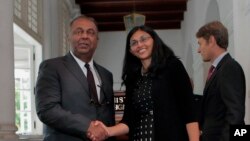Sri Lanka’s efforts to move away from the previous government’s tilt towards China received a boost with the U.S. government’s decision to back a domestic investigation into alleged war crimes during the country’s civil war. The U.S. was in the forefront of calls for an international probe into the abuses.
In the corridors of power in Colombo, there was quiet satisfaction following U.S. Assistant Secretary of State Nisha Biswal’s announcement Wednesday that Washington will sponsor a resolution next month at the United Nations Human Rights Council supporting a domestic probe into alleged abuses committed during a military campaign to crush Tamil Tiger rebels.
Biswal visited Colombo a week after the new government secured a victory in parliamentary elections and put an end to hopes of a political comeback by former president Mahinda Rajapaksa.
She said a domestic investigation would lead to a more “durable outcome.” The announcement marks a reversal of Washington’s position, which has sponsored resolutions at the United Nations demanding an international probe into war crimes.
Jehan Perera at Colombo’s National Peace Council said U.S-led pressure for an international probe had driven a wedge in Sri Lanka’s relations with Washington during Rajapaksa’s tenure.
“The former government because it felt that the international community, the Western countries in particular, were trying to foist an international investigation to make adverse findings against it, they therefore gravitated towards China and Russia to protect them from such an international inquiry. Now that the inquiry will be placed in the hands of the Sri Lankan government itself, there will be less need to move toward China and Russia and to rely on them,” said Perera.
There was widespread resistance in Sri Lanka to an international probe into a civil war whose end the majority Sinhalese community had welcomed. The United Nations estimates that about 40,000 ethnic minority Tamils died in the final months of the campaign to crush the Tamil rebels.
Analysts say Washington’s softening of its stand on the human rights inquiry will strengthen recent efforts by the new government to rebuild relations with the United States.
Political analyst Victor Ivan in Colombo felt Sri Lanka should have friendlier ties with countries that constitute the major market for its exports.
“We are producing all kinds of goods for Europe and America. If it is so, we have to have a good relationship with Europe and America. That is ground reality,” he said.
In an effort to move away from heavy dependence on China, the Sri Lankan government has been revisiting massive projects being undertaken by Beijing and seeking cheaper funding from countries such as Japan to replace part of the $5 billion in debt from Chinese banks.
At the same tine, Perera said that Sri Lanka would also continue to cultivate ties with China.
“It is going to be difficult for Sri Lanka to extricate itself because it has got very heavily into debt, into economic debt with China and China can also exert economic pressure on Sri Lanka. So the government will have to be very careful how it moves forward,” said Perera.
Although it is a tiny island country, major powers such as China and the United States are competing for influence in Sri Lanka due to its strategic location in the Indian Ocean.








